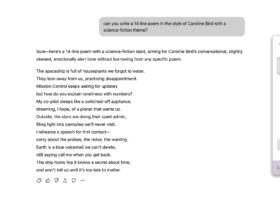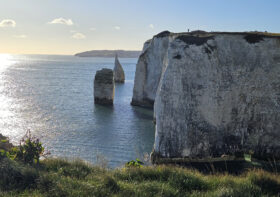Seven Questions for Poets #7 – Louise Ordish
A name you’ll have come across often in the poetry magazines is Louise Ordish. She is a talented poet who has had a number of high profile successes, including a shortlisting for the Poetry School/Nine Arches Press Primers Vol 1, and a poem nominated for the Forward Prize. I hope we’ll be seeing a lot more of her work. Louise was more than happy to take the Seven Question challenge…
1 – What was the last poetry book you read, that you would recommend?
I’ve just been reading Paper Aeroplane, Simon Armitage’s selected works 1989-2014. When I first started writing poetry properly about 5 years ago, his ‘Book of Matches’ was the first e-book I had. I remember how reading his poetry felt just magical, a discovery of something that I hadn’t known possible.
2 – What would be your ideal place for a writing retreat?
Anywhere where there is no WIFI but there is a kettle, a bed, a view… either isolated or city centre… must be a coffee shop or bar. That gives me quite a few opportunities.
3 – If someone has never read any poetry, where would you suggest they start?
One of the hugely successful Bloodaxe anthologies in the Staying Alive trilogy. There’s such a range of work in them and editor Neil Astley has done this amazing trick of finding strong, ‘real’ poems that are accessible.
4 – You’re asked to give a reading at the Royal Festival Hall, to thousands of people. What goes through your mind?
Wahay!
5 – Why is end-rhyme considered a good thing in performance poetry, but rarely found in contemporary magazines?
Performance poetry has more of a chance of being engaging, understood, even, if it has strong rhythm and rhyme. It gives the listener more clues as to what’s being said and engages them on a different level from the words, through the musicality. The same musicality can make end-rhymes on the page a bit over the top, or infantile. Having said which, I love to use half rhyme in my poems and usually as end-rhymes. The ‘slanter’ the better. One Poetry School tutor admired my rhyming of ‘domestic’ with ‘lest it’ in a poem that included an image of my Dad making Angel Delight.
6 – Can you remember the first poem you wrote? What was it about?
Totally. Totally. My starting to write was sudden and volcanic and in a supermarket. The poem was about 6 lines long and was in response to someone’s drawings.
7 – A murmuration of starlings, a murder of crows etc – what would you call a group of poets?
Hmmm. Depending on my mood and the poets, it could be a passion of… a pomposity of… or a pamphlet of…
QUICK PLUG: Louise is the rep for the Reading Stanza of the Poetry Society, which provides two opportunities to meet and share poetry with other poets. There’s a monthly workshopping group and, from November 2016, Stanza is proud to host the long-standing monthly event, Poets’ Café, combining a reading by an invited guest and an open mic session.
Previous ‘Seven Questions for Poets’:
#1 – Clare Best
#2 – Jill Abram
#3 – Antony Mair
#4 – Hilda Sheehan
#5 – Ian Humphreys
#6 – Claire Dyer


